#inklings story
Text
my current wip list
Hands Made for Gentleness is about my two dear idiots Vaniah and Anneka, who get married to dodge an arranged-marriage law. Vaniah is incredibly traumatised by events in his past. Anneka discovers this as time goes by. It's a story of healing, mainly, and mental health. Boatload of trigger warnings (Vaniah is severely depressed, suicidal and all that goes with that, while Anneka is in recovery from anorexia) but I love them so much and I love the energy that's between them. At this moment I'm writing a scene in which they're arguing because Vaniah abruptly shut down a kissing scene without explanation and the conversation afterwards got mildly heated. Also they basically end up in a QPR more than a traditional romantic relationship and I love that for them. They're late twenties or so during this novel. First draft.
Patience, Changing is about Patience and her adopted sister Rhona. Patience is my autistic darling, Rhona is my current Discord pfp and anyway I love them. They have interpersonal conflicts that form the nucleus of the novel, but they work them out in the end. Teenagers, and absolutely no romantic relationships in this story which I love. Also it's set in my home city of Melbourne. First draft.
To Kindle a Flame is the first book of an embarrassingly big series. I first wrote the earliest draft for camp nanowrimo or nanowrimo itself, 2017. It started out as one book, in fact started out as a simple response to a concept outlined and failed to bring to a satisfying conclusion by a Christian book by someone in my denomination - In Search of Life by Anna Tikvah. I loved the concept (girl has questions about life, turns to the Bible and reads it, things happen), but then Verity never questioned that the Bible was true, which seemed wack to me. So I started writing a story in which my main character (Adira) found a copy of the Bible and then began to read it, but the whole time she's questioning it. It turned into about 300k of messy drafting (I've drafted it uhh three times by now and am gradually working on overhauling it, grabbing what bits I can and then finishing the draft, ideally this year) and has become a story about mental health, choices and the way people figure out beliefs. In the Gospels there's a line in which Pilate says "What is truth?" - that's basically the tagline of To Kindle a Flame. It's also dystopian. It's my beloved baby. Anyway I'm normal about this story. Also Adira is autistic. Oops. I didn't intend that. I just looked at her character one day and went Yet Another Autistic Character Ay. xD It's also set in Melbourne, but aforementioned dystopia renders Melbourne unrecognisable. I've done a bunch of worldbuilding on her. Also features the character who was the first openly queer character I ever wrote - Tom, who's bi, though he ends up married to Adira and never has a mlm relationship during the story (has prior - in the story he's side B). Somewhere between first and second drafts.
Do Roses Cast Shadows? was the most recent nanowrimo, and I got a grand total of 12k into it. I uh. Don't know what's going on really. I don't recall much, but I'd like to get back to it someday. My characters are Wren and I can't recall the male main character's name.
They Told Me To Name My Demons is a poetry collection I'm working up to publication someday. It's about Christianity, suicidality, depression, autism and identity. I plan to include 100 poems and 7 prose pieces, of which I've so far written and somewhat edited 84 poems (might have a few more, I haven't crossreferenced with my phone lately) and 4 pieces of prose. The title is from a blog post I read years ago and then wrote a poem in response to. Most of the poems have been written in the last year or two. I chase inspiration where I see it. First draft.
Sparks Under Heaven is a collection of five short stories/novellas, all connected to To Kindle a Flame (one features Adira, two her grandfather, one someone another character knew in his youth and the other focuses on an event from To Kindle a Flame but from someone else's perspective). I've had it professionally edited but the edits are sitting there still waiting to be touched, largely. Second-last round of edits before I self publish.
Through Lightning, Through Thunder was nanowrimo 2022, the happiest novel I've ever written and absolutely beloved. It features Taira (rabbit), Paddy (fox), Sheba (lynx), and various less important characters. It started out life as a Narnia fanfic, focused around my original characters with occasional mentions of the Four. It was 15k. Then I fleshed it out into a full original novel, 100k-and-counting. Oopsie. The good guys are trying to stop an evil dragon being resurrected (based on the Witch scene in Prince Caspian). In the end everyone lives happily ever after. Yay. Second draft.
[Inklings story] is about Hadassah, autistic darling of my heart who is thrown through a portal and discovers a found family on the other side, essentially. Downtrodden autistic but becomes happy and confident. First draft.
The Time Travelling Midwife is about Felicity, ALSO autistic (surprise!). I haven't got very far with this one either, it exists mostly in vibes in my mind. It's best summarised as the story with the time travelling midwife, who travels in time, is an angel, tries to stop evil from prevailing and when it does eventually through the building of the tower of Babel (mainly facilitated by one of her colleagues), her time travelling powers are taken away and she ends up settling somewhere in the 1900s and having a happy life. First draft.
Only the first and second are in active development right now. Please ask me about any part of any thing of this post. I copied and pasted directly from the Discord in which I rambled about them.
If I've forgotten any wips that you know about please tell me, lol. And this is only about full length novels or collections, not shorter stories.
#hands made for gentleness#patience changing#to kindle a flame#do roses cast shadows?#they told me to name my demons#sparks under heaven#through lightning through thunder#inklings story#the time travelling midwife#my writing#my wips
9 notes
·
View notes
Text
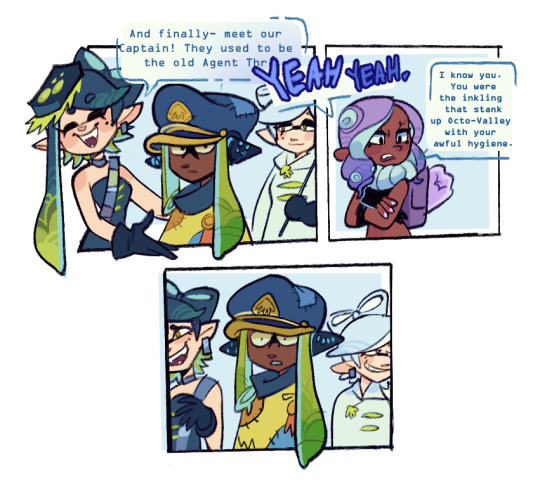
Keep thinking back to the lines of Marie just roasting Agent 3 during splatoon 2's storymode- combined with playing an octoling in 3, I like to imagine the new captain left an unfortunate legacy behind
#agent 3#new agent 3#splatoon#splatoon 3#splatoon 3 story mode#callie#marie#agent free#inkling#octoling#comic
16K notes
·
View notes
Text
Ain’t nobody gonna see this but I have theory of the Calamari Inkantation. Splatoon 3 Spoilers.
Okay so I was listening to Wave Goodbye, the Splatoon 3 Credits Song, over and over like a normal person, when at some point I realized when they get to the portion that starts the Calamari Inkantation lyrics, there are non-filtered voices singing. Humans Voices. (Pictured is around the point where that section starts)

Then I thought to myself: What if the Calamari Inkantation originated as a song humans made on Alterna? A song to help them continue despite their world falling around them. Then I started looking into the logs and reflecting on past events with the song and..
Let’s just say Sunken Scroll #23 from Splatoon 1 saying: “Nowadays, this song and dance may as well be carved into the very DNA of all Inklings.” ..might be a tiny bit more literal than expected. Let’s take a look at what we know.
The Calamari Inkantation is a literal incantation. Series of words, or a song in this case, that causes magical effects. It has, in many cases, been known to give strength, physical or otherwise, to those who have been in audible range of it. Ex. Giving Cuttlefish the strength to break out of his restraints and Smallfry to temporarily evolve(?) into Hugefry.
With that said, I believe the “Calamari” part could be from the place it was “founded” in and taken on as a traditional song for. Calamari Country. Which is where Callie and Marie come from. Perhaps the Inklings of the area long ago found the sheet music.
Moving on, the part of this that helps this theory’s case is Alterna Log005: Fresh Intelligence Awakens.
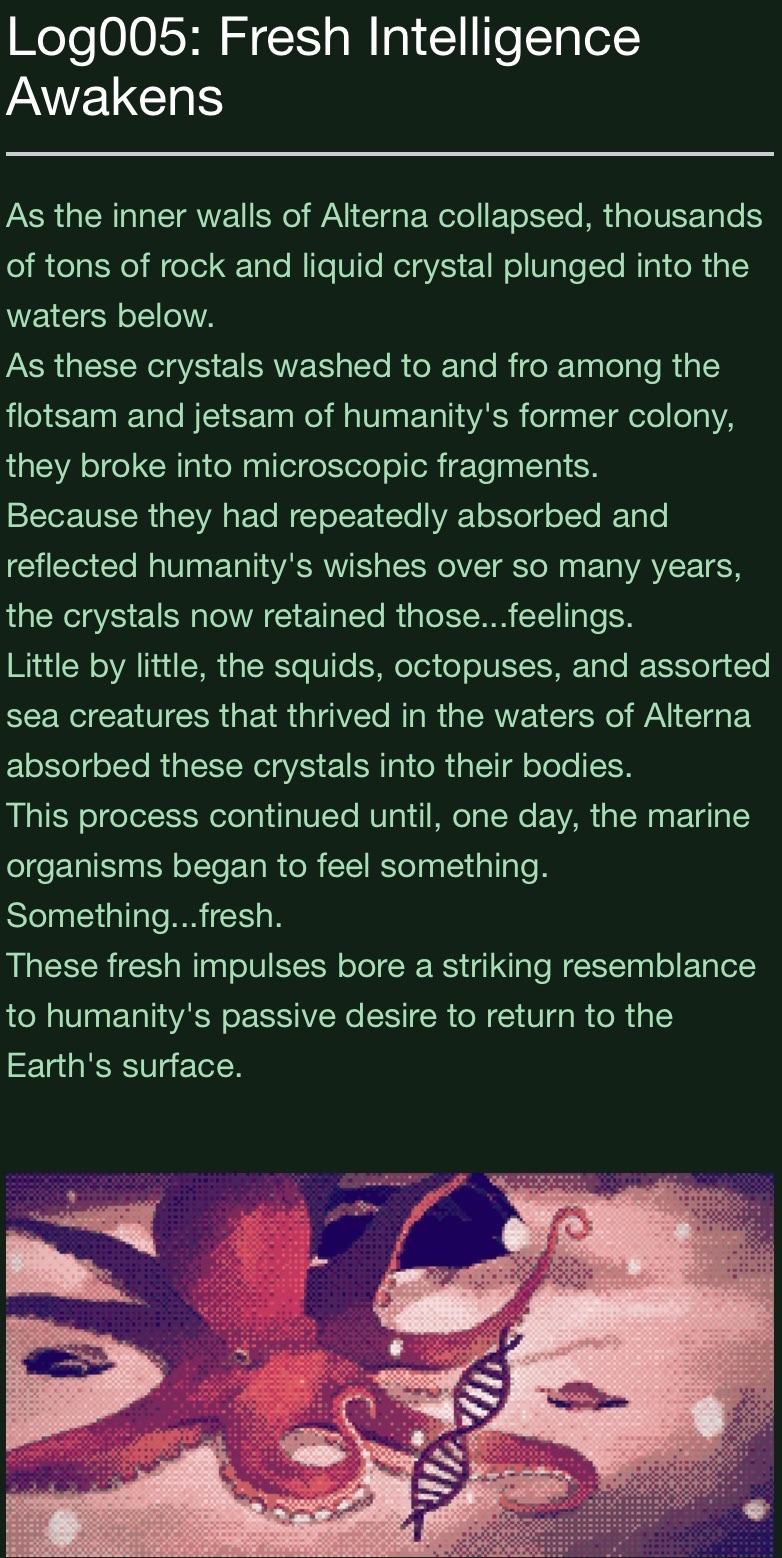
After the liquid crystals that retained decades of humanity’s wishes was absorbed by the squids, octopuses, and other sea creatures that inhabited Alterna’s waters.. it imbued them with fresh impulses that “bore a striking resembling to humanity’s passive desire to return to the Earth’s surface”.
Interesting. The desire to return to the surface was slowly fused into their DNA. You may be thinking “But what does this have to do with the Inkantation?” And that’s exactly where I’m going with this.
So if we are to think.. the Calamari Inkantation was made by the humans on Alterna, perhaps filled lyrically with their wishes.. and the sea creatures absorbed the desire and wishes of humanity to return to the surface through the liquid crystals.. and the Calamari Inkantation gives sea creatures the literal strength to move forward..
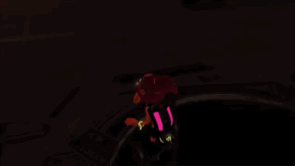
And the INKADIA-BORN OCTOLINGS, who were SUFFERING in poor conditions UNDERGROUND in DOMES heard the CALAMARI INKANTATION and suddenly their “SOULS WERE FREED” and THE DESIRE TO RETURN TO THE SURFACE AND THRIVE WAS EVOKED INTO THEM AGAIN?
AFTER YEARS OF LIVING A HARD MILITARISTIC-STYLE LIFE WITH BEING INDUCTED INTO THE ARMY AT A YOUNG AGE, THEY FOUND THE STRENGTH TO LEAVE THEIR ENTIRE OLD LIFE BEHIND? TO RISK IT ALL. EVEN THEIR OWN LIFE. TO JOIN WHAT THEY WERE PRESUMED TO BE THEIR WORST ENEMIES ON THE SURFACE IN HARMONY?
After thinking about all this and rewatching the Octo Expansion Surface Cutscene (from that last GIF), I nearly wanted to CRY. They had never seen the real sky before, the real SUN before. They made it. Not only the Octolings but humanity’s final wishes made it too.
That’s my theory. Perhaps I’m wrong but either way I would love to see what people think. Thanks for reading.
Oh and also, since it named the “Inkantation” that means someone knew of its power... This just in, did the Inklings cheat in the Great Turf War?
But that’s for another day lol
#splatoon3#splat3#Octo Expansion#Calimari Inkantation#Splat2n#Splatoon 2#splat2#Squid Sisters#Splatoon Lore#Splatoon Theory#Lore#Splatoon#Alterna#Splatoon 3 Story Mode#return of the mammalians#Octoling#octarian#Octolings#inklings#inkling#Inkadia#Splatlands#MalcolmsLoreBoard#Nintendo#Off the Hook#Marina Ida#splatoon marina#splatoon squid sisters#splatoon off the hook#splatoon 3
4K notes
·
View notes
Text
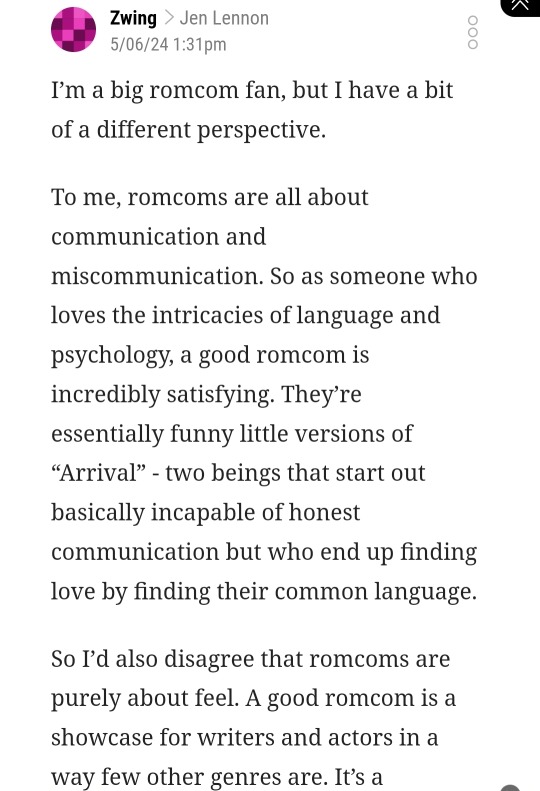

This AV Club comment is making me so desperate to write a romcom, you have no idea.
#adventures in writing#the trouble is that the idea begins and ends with 'romcom!'#the same way my desire to write mysteries would be 'they solve a mystery!' and i'd have no idea what the mystery was#there's this idea that keeps niggling me#from back when i was just braindumping potential elements i might want to make use of in an inklings story#and looking back at it later the list elements of 'arranged marriage' and 'rom com' stuck out#as well as a world that involves politics and mermaids#and my brain keeps trying to tell me this is a viable idea while providing zero plot or characters#see the thing about rom coms is that they require detailed characters who need their own arcs#the thing i'm bad at!#so it's hard to fulfill this writing craving because all my brainstorming instincts to start with the plot work against me here
145 notes
·
View notes
Text
FOR THE FANS OUT THERE WHO CAN'T GET ENOUGH OF SPLATOON.
UPDATE: WTF? (WHAT THE FLYFISH?) I am sooo freaked out by the upcoming big run... I am a casual player...so I'm gonna be splatted more den once already find one King hard tah deal with...but 3?
"Learn the rules like a Pro, so you can break them like an Artist"-Pablo Picasso
"There is no line between an Author and an Artist" - ???
If your like me and love reading, listening and seeing fanart,music and stories all based around Splatoon...well look no futher!
IF ya wanna see a bunch of amusing and comedic, like memes or mini comics collected from all just #sploonies. (I also have links too some of my own stuff lol)
Do me a favor and reblog this! or...atleast share it! More inkfolk who see thia the better!
# splatsville sploonies if yah wanna see all dah memes ive reblogged from tumblr!
HERE IS A LIST OF 93 STORIES ALL LOVINGLY WRITTEN BY FELLOW FANS LIKE YOURSELF.
I reaaaad alllooot. So these are what I get when the game ain't enough. I made this lil list from myself and others. Authors who have taken their time to let us dive into their inky tales or love, danger,action,fluff and... the risqué.
AND THIS IS A PLAYLIST OF....
Yah your reading right. Over 377 songs. Remixes, Fanmade, Originals and so much more!
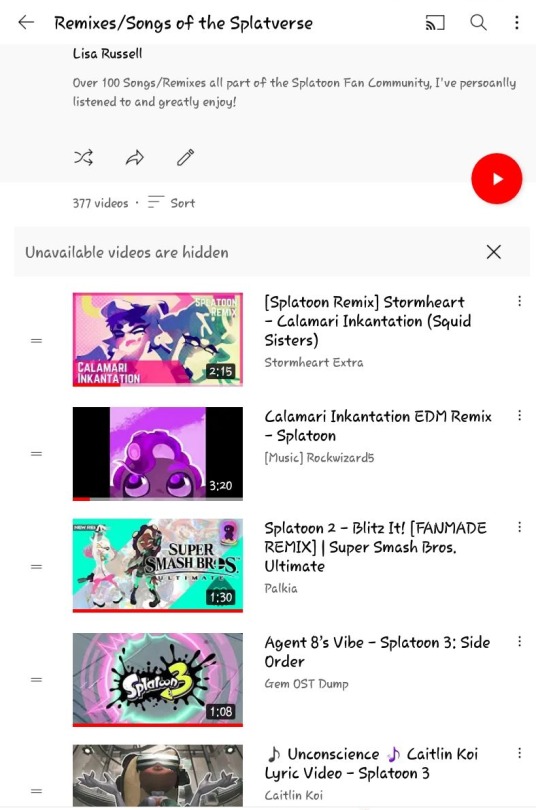
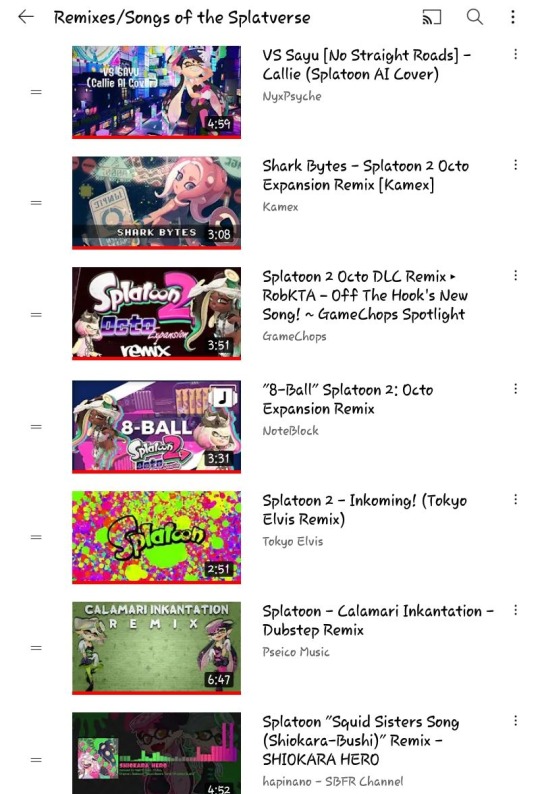
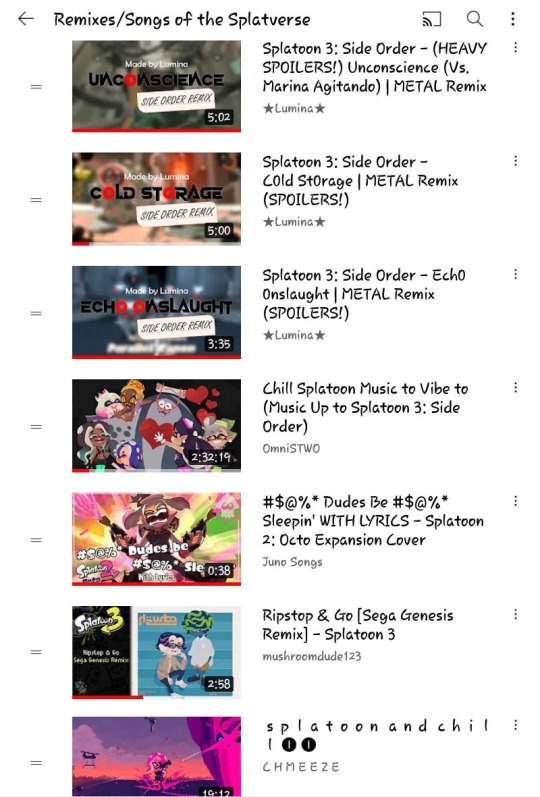
CHECK THIS OUT!
Ya, 8 links up but they lead too some really good fan comics. I consider small panels one and full series. Feel free teh let me know or suggest some!
And an INDEPTH AND UPDATED AGENT 4 SIDE ORDER THOERY BLOG!
This a rather interesting Reddit Post about how music effects Inklings and Octolings!
An A.I Assistant thoughts(?) On Octo Expansion sanitizing and dah memverse cure...
A lil blog on how agents cannon lore wise have such neat lil details about em!
My stuff lol
These are also link's tah my Artwork.
Latest Update!
HES FULLY DONE!
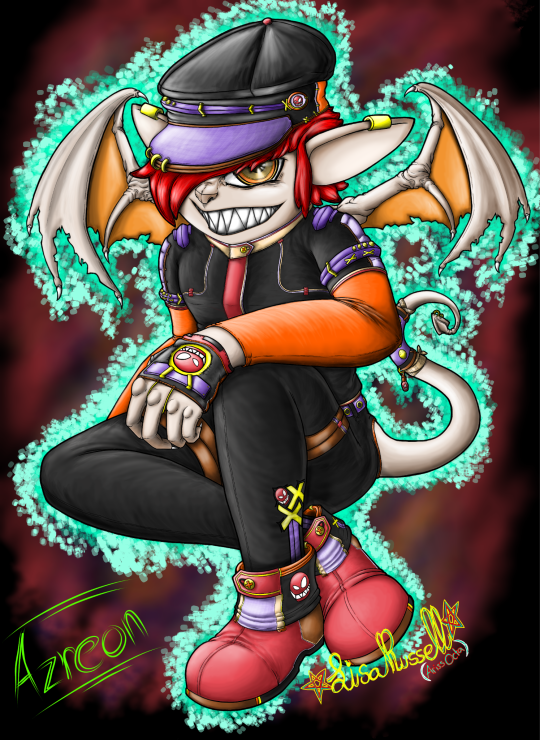
Below one has dah older handrawn on paper work of mine.
And my more r3cent digital work...word of warning I take weeks tah months just tah finish one..I'm a bit of a perfectionist and detail lover lol...
#splatoon 3#splatoon 2#splatoon#splatoon fandom#splatoon3#splatoon oc#new squidbeak splatoon#splat series#splatoon 1#splatoon fanfiction#splatoon music#splatoon remix#splatbands#splatoon2#nintendo#youtube#splatoon comic#side order#octo expansion#story heromode#agent 8#agent 3#agent 4#octoling#inkling#neo agent 3#marina ida#pearl houzuki#captain3#callie cuttlefish
379 notes
·
View notes
Text

Thank you Splatoon for the memories and influence. Without you, I wouldn't have created so many wonderful characters and stories!!! Blue is one of my top favorite and complicated OCs and I absolutely adore him hehe! I hope to continue his story in Perspective!!
#splatoon#splatoon 3#blue#inkling#nintendo#fanart#art#ds art#doodles#THANK YOU SPLATOON#I made so many wonderful friends and memories with the first game#I hope to continue everyone's stories in Perspective!
110 notes
·
View notes
Text
Psst, hey.
Hey you.
Come closer.
Listen to what I'm about to say good and well, alright?

#out of queue#ani rambles#anti ai#anti ai art#solarpunk#solarpunk aesthetic#does this have the official backing of the other 2 event hosts? no i just made this meme on a whim#but also if you try submitting AI art and we find out? or worse if I can flat-out TELL its AI? I'm blocking your ass#one of the best artists I've ever had the pleasure of knowing won't touch the Solarpunk community with a 10 foot pole because of all the#goddamn AI art infiltrating this space. constantly. like even when I'm trying to be on the lookout for it I somehow reblog it anyways#even when I block the tags too!!!! this is a PROBLEM#you want more artists taking part in this community spreading the vision visualizing the future?#STOP REBLOGGING AI BULLSHIT AND CHASING THEM AWAY THEN#how are artists supposed to feel accepted and appreciated and loved by this community when every other piece under the tag is some fuckin#midjourney bs made my scrubbing the internet and spitting out a mishmash of other artists' works and ideas?#i have said it before I will say it again#i would rather see a messy pen scribble on the back of a coffee stained napkin with stickfigures than see some smooth smudgy AI BS again#this applies to AI writing too if I catch an INKLING that your short story even STARTED with some bs chatgpt ramblings you're blocked
473 notes
·
View notes
Text
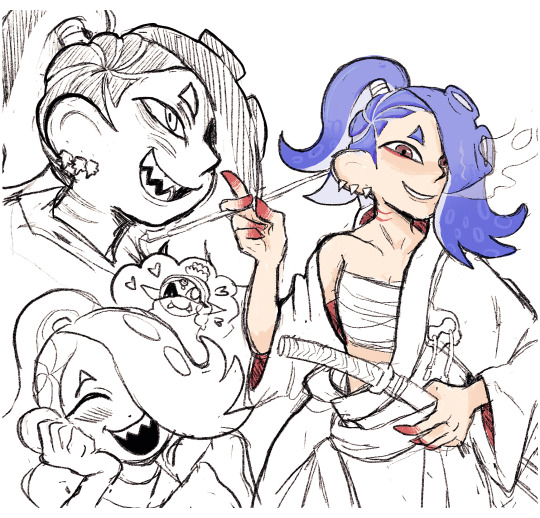


ummmuumm what if we were from different families and we kissed
#my art#splatoon#splatoon 2#splatoon 3#splatoon3#deep cut#splatoon deep cut#shiver and Frye#deep cut shiver#deep cut frye#deep cut shiver and frye#splatoon idols#splatoon inkling#splatoon octoling#Splatoon sunken scrolls#sunken scrolls#splatoon 3 story mode#splatoon story mode#Splatoon art#frye x shiver#shiver x frye#octoling#inkling#splatoon fanart
904 notes
·
View notes
Text

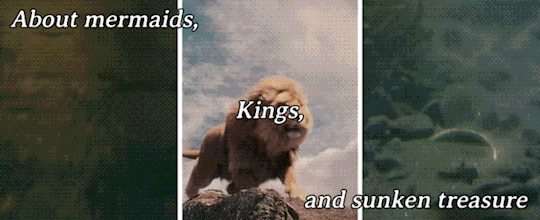
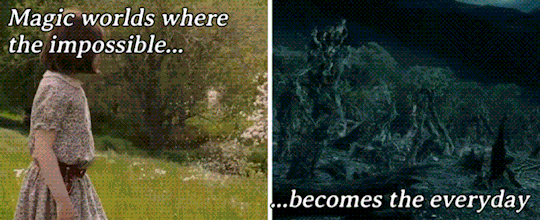


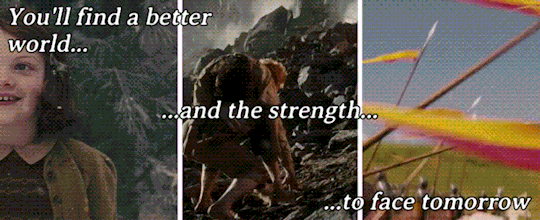
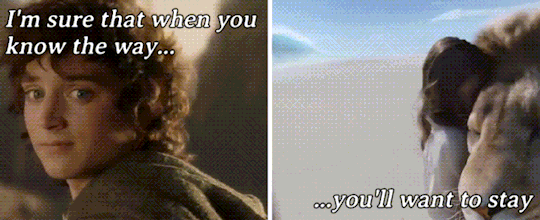
📖
#Merry Christmas?? wasn't expecting to finish this today lol#my tribute to the stories of my two fave dear Inklings 💖#they've helped so much during the loss of my sister#the chronicles of narnia#the lord of the rings#lord of the rings#narnia#the inklings#c. s. lewis#j. r. r. tolkien#c s lewis#j r r tolkien#;Faith's GIFs#lotredit#narniaedit
108 notes
·
View notes
Text
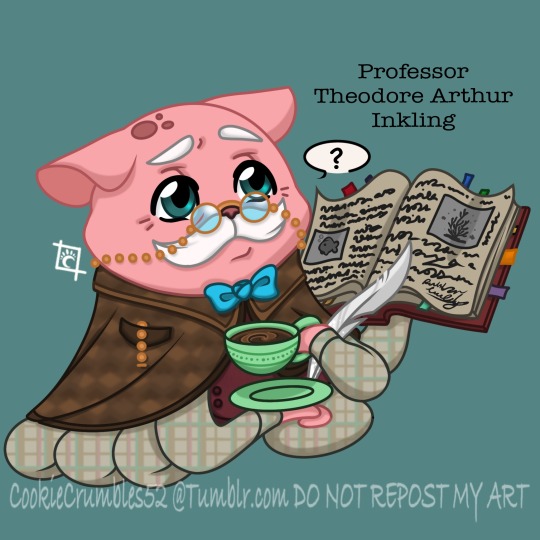
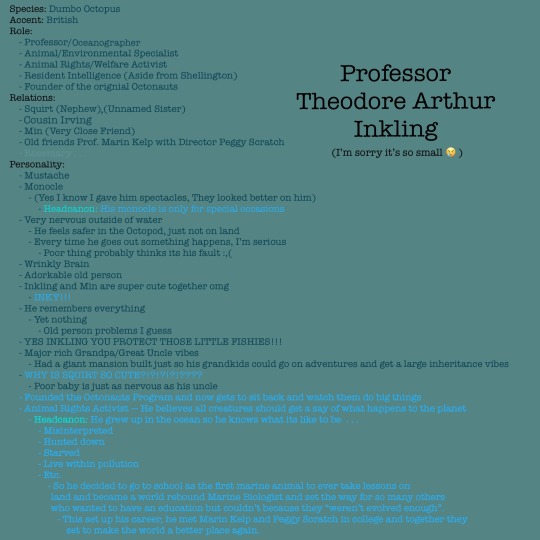
Professor T. A. Inkling — Founder/Professor/Oceanographer
Illustration Time (Peso/Prof. Inkling): 7hrs 7m
[ DO NOT REPOST, ALL ART & CONCEPTS WERE MADE BY ME ]
I forgot to look at his wiki so if I missed anything . . . Then please let me know! Or y’know . . . just forgive me???
[ This is an Octonauts AU, in no way is this canon to the OG storyline. ]
#octonauts#octonauts fanart#octonauts story#octonauts redesigns#octonauts redesign#professor inkling#professor inkling redesign#Octonauts Story#Octonuats the ASA#octonauts above and beyond
68 notes
·
View notes
Text
If I was to start up a writing newsletter, what features would be interesting? Spitballing at present. They're not mutually exclusive.
drabble
writing update/s
life update/s
excerpt
photo of Ransom
other photo/s
art/s
poem/s
free short story
reading updates
#my writing#writeblr#creative writing#writing community#editing a couple of hadassah inklings stories at present to be a 'when you join this newsletter' gift#one of which i've pulled from my website the other i've never shared#because i'm not happy with the autism rep the way i originally wrote it#hadassah winter#inklings story#a fragile solace#ever changing ever near#<- the last two are the titles for the stories
6 notes
·
View notes
Text


misunderstandings…!
#a part of my silly 24 story that i wanna make but also i don’t know how to articulate it….#3 shows love physically(like little kissies and stuff) as is common in inkling culture…#however 8 tends to follow a more (hc)octarian approach thru actions:]#ur honor they are silly#my art#myart#agent 24#agent 3#agent 8#sicily(3)#kait(8)#splatoon#splatoon 3#fanart#comic#digital art#artists on tumblr
436 notes
·
View notes
Text
Tell Your Dad You Love Him
A retelling of "Meat Loves Salt"/"Cap O'Rushes" for the @inklings-challenge Four Loves event
An old king had three daughters. When his health began to fail, he summoned them, and they came.
Gordonia and Rowan were already waiting in the hallway when Coriander arrived. They were leaned up against the wall opposite the king’s office with an air of affected casualness. “I wonder what the old war horse wants today?” Rowan was saying. “More about next year’s political appointments, I shouldn’t wonder.”
“The older he gets, the more he micromanages,” Gordonia groused fondly. “A thousand dollars says this meeting could’ve been an email.”
They filed in single-file like they’d so often done as children: Gordonia first, then Rowan, and Coriander last of all. The king had placed three chairs in front of his desk all in a row. His daughters murmured their greetings, and one by one they sat down.
“I have divided everything I have in three,” the king said. “I am old now, and it’s time. Today, I will pass my kingdom on to you, my daughters.”
A short gasp came from Gordonia. None of them could have imagined that their father would give up running his kingdom while he still lived.
The king went on. “I know you will deal wisely with that which I leave in your care. But before we begin, I have one request.”
“Yes father?” said Rowan.
“Tell me how much you love me.”
An awkward silence fell. Although there was no shortage of love between the king and his daughters, theirs was not a family which spoke of such things. They were rich and blue-blooded: a soldier and the daughters of a soldier, a king and his three court-reared princesses. The royal family had always shown their affection through double meanings and hot cups of coffee.
Gordonia recovered herself first. She leaned forward over the desk and clasped her father’s hands in her own. “Father,” she said, “I love you more than I can say.” A pause. “I don’t think there’s ever been a family so happy in love as we have been. You’re a good dad.”
The old king smiled and patted her hand. “Thank you, Gordonia. We have been very happy, haven’t we? Here is your inheritance. Cherish it, as I cherish you.”
Rowan spoke next; the words came tumbling out. “Father! There’s not a thing in my life which you didn’t give me, and all the joy in the world beside. Come now, Gordonia, there’s no need to understate the matter. I love you more than—why, more than life itself!”
The king laughed, and rose to embrace his second daughter. “How you delight me, Rowan. All of this will be yours.”
Only Coriander remained. As her sisters had spoken, she’d wrung her hands in her lap, unsure of what to say. Did her father really mean for flattery to be the price of her inheritance? That just wasn’t like him. For all that he was a politician, he’d been a soldier first. He liked it when people told the truth.
When the king’s eyes came to rest on her, Coriander raised her own to meet them. “Do you really want to hear what you already know?”
“I do.”
She searched for a metaphor that could carry the weight of her love without unnecessary adornment. At last she found one, and nodded, satisfied. “Dad, you’re like—like salt in my food.”
“Like salt?”
“Well—yes.”
The king’s broad shoulders seemed to droop. For a moment, Coriander almost took back her words. Her father was the strongest man in the world, even now, at eighty. She’d watched him argue with foreign rulers and wage wars all her life. Nothing could hurt him. Could he really be upset?
But no. Coriander held her father’s gaze. She had spoken true. What harm could be in that?
“I don’t know why you’re even here, Cor,” her father said.
Now, Coriander shifted slightly in her seat, unnerved. “What? Father—”
“It would be best if—you should go,” said the old king.
“Father, you can’t really mean–”
“Leave us, Coriander.”
So she left the king’s court that very hour.
.
It had been a long time since she’d gone anywhere without a chauffeur to drive her, but Coriander’s thoughts were flying apart too fast for her to be afraid. She didn’t know where she would go, but she would make do, and maybe someday her father would puzzle out her metaphor and call her home to him. Coriander had to hope for that, at least. The loss of her inheritance didn’t feel real yet, but her father—how could he not know that she loved him? She’d said it every day.
She’d played in the hall outside that same office as a child. She’d told him her secrets and her fears and sent him pictures on random Tuesdays when they were in different cities just because. She had watched him triumph in conference rooms and on the battlefield and she’d wanted so badly to be like him.
If her father doubted her love, then maybe he’d never noticed any of it. Maybe the love had been an unnoticed phantasm, a shadow, a song sung to a deaf man. Maybe all that love had been nothing at all.
A storm was on the horizon, and it reached her just as she made it onto the highway. Lightning flashed and thunder rolled. Rain poured down and flooded the road. Before long, Coriander was hydroplaning. Frantically, she tried to remember what you were supposed to do when that happened. Pump the brakes? She tried. No use. Wasn’t there something different you did if the car had antilock brakes? Or was that for snow? What else, what else–
With a sickening crunch, her car hit the guardrail. No matter. Coriander’s thoughts were all frenzied and distant. She climbed out of the car and just started walking.
Coriander wandered beneath an angry sky on the great white plains of her father’s kingdom. The rain beat down hard, and within seconds she was soaked to the skin. The storm buffeted her long hair around her head. It tangled together into long, matted cords that hung limp down her back. Mud soiled her fine dress and splattered onto her face and hands. There was water in her lungs and it hurt to breathe. Oh, let me die here, Coriander thought. There’s nothing left for me, nothing at all. She kept walking.
.
When she opened her eyes, Coriander found herself in a dank gray loft. She was lying on a strange feather mattress.
She remained there a while, looking up at the rafters and wondering where she could be. She thought and felt, as it seemed, through a heavy and impenetrable mist; she was aware only of hunger and weakness and a dreadful chill (though she was all wrapped in blankets). She knew that a long time must have passed since she was fully aware, though she had a confused memory of wandering beside the highway in a thunderstorm, slowly going mad because—because— oh, there’d been something terrible in her dreams. Her father, shoulders drooping at his desk, and her sisters happily come into their inheritance, and she cast into exile—
She shuddered and sat up dizzily. “Oh, mercy,” she murmured. She hadn’t been dreaming.
She stumbled out of the loft down a narrow flight of stairs and came into a strange little room with a single window and a few shabby chairs. Still clinging to the rail, she heard a ruckus from nearby and then footsteps. A plump woman came running to her from the kitchen, wiping her hands on her apron and softly clucking at the state of her guest’s matted, tangled hair.
“Dear, dear,” said the woman. “Here’s my hand, if you’re still unsteady. That’s good, good. Don’t be afraid, child. I’m Katherine, and my husband is Folke. He found you collapsed by the goose-pond night before last. I’m she who dressed you—your fine gown was ruined, I’m afraid. Would you like some breakfast? There’s coffee on the counter, and we’ll have porridge in a minute if you’re patient.”
“Thank you,” Coriander rasped.
“Will you tell me your name, my dear?”
“I have no name. There’s nothing to tell.”
Katherine clicked her tongue. “That’s alright, no need to worry. Folke and I’ve been calling you Rush on account of your poor hair. I don’t know if you’ve seen yourself, but it looks a lot like river rushes. No, don’t get up. Here’s your breakfast, dear.”
There was indeed porridge, as Katherine had promised, served with cream and berries from the garden. Coriander ate hungrily and tasted very little. Then, when she was finished, the goodwife ushered her over to a sofa by the window and put a pillow beneath her head. Coriander thanked her, and promptly fell asleep.
.
She woke again around noon, with the pounding in her head much subsided. She woke feeling herself again, to visions of her father inches away and the sound of his voice cracking across her name.
Katherine was outside in the garden; Coriander could see her through the clouded window above her. She rose and, upon finding herself still in a borrowed nightgown, wrapped herself in a blanket to venture outside.
“Feeling better?” Katherine was kneeling in a patch of lavender, but she half rose when she heard the cottage door open.
“Much. Thank you, ma’am.
“No thanks necessary. Folke and I are ministers, of a kind. We keep this cottage for lost and wandering souls. You’re free to remain here with us for as long as you need.”
“Oh,” was all Coriander could think to say.
“You’ve been through a tempest, haven’t you? Are you well enough to tell me where you came from?”
Coriander shifted uncomfortably. “I’m from nowhere,” she said. “I have nothing.”
“You don’t owe me your story, child. I should like to hear it, but it will keep till you’re ready. Now, why don’t you put on some proper clothes and come help me with this weeding.”
.
Coriander remained at the cottage with Katherine and her husband Folke for a week, then a fortnight. She slept in the loft and rose with the sun to help Folke herd the geese to the pond. After, Coriander would return and see what needed doing around the cottage. She liked helping Katherine in the garden.
The grass turned gold and the geese’s thick winter down began to come in. Coriander’s river-rush hair proved itself unsalvageable. She spent hours trying to untangle it, first with a hairbrush, then with a fine-tooth comb and a bottle of conditioner, and eventually even with honey and olive oil (a home remedy that Folke said his mother used to use). So, at last, Coriander surrendered to the inevitable and gave Katherine permission to cut it off. One night, by the yellow light of the bare bulb that hung over the kitchen table, Katherine draped a towel over Coriander’s shoulders and tufts of gold went falling to the floor all round her.
“I’m here because I failed at love,” she managed to tell the couple at last, when her sorrows began to feel more distant. “I loved my father, and he knew it not.”
Folke and Katherine still called her Rush. She didn’t correct them. Coriander was the name her parents gave her. It was the name her father had called her when she was six and racing down the stairs to meet him when he came home from Europe, and at ten when she showed him the new song she’d learned to play on the harp. She’d been Cor when she brought her first boyfriend home and Cori the first time she shadowed him at court. Coriander, Coriander, when she came home from college the first time and he’d hugged her with bruising strength. Her strong, powerful father.
As she seasoned a pot of soup for supper, she wondered if he understood yet what she’d meant when she called him salt in her food.
.
Coriander had been living with Katherine and Folke for two years, and it was a morning just like any other. She was in the kitchen brewing a pot of coffee when Folke tossed the newspaper on the table and started rummaging in the fridge for his orange juice. “Looks like the old king’s sick again,” he commented casually. Coriander froze.
She raced to the table and seized hold of the paper. There, above the fold, big black letters said, KING ADMITTED TO HOSPITAL FOR EMERGENCY TREATMENT. There was a picture of her father, looking older than she’d ever seen him. Her knees went wobbly and then suddenly the room was sideways.
Strong arms caught her and hauled her upright. “What’s wrong, Rush?”
“What if he dies,” she choked out. “What if he dies and I never got to tell him?”
She looked up into Folke’s puzzled face, and then the whole sorry story came tumbling out.
When she was through, Katherine (who had come downstairs sometime between salt and the storm) took hold of her hand and kissed it. “Bless you, dear,” she said. “I never would have guessed. Maybe it’s best that you’ve both had some time to think things over.”
Katherine shook her head. “But don’t you think…?”
“Yes?”
“Well, don’t you think he should have known that I loved him? I shouldn’t have needed to say it. He’s my father. He’s the king.”
Katherine replied briskly, as though the answer should have been obvious. “He’s only human, child, for all that he might wear a crown; he’s not omniscient. Why didn’t you tell your father what he wanted to hear?”
“I didn’t want to flatter him,” said Coriander. “That was all. I wanted to be right in what I said.”
The goodwife clucked softly. “Oh dear. Don’t you know that sometimes, it’s more important to be kind than to be right?”
.
In her leave-taking, Coriander tried to tell Katherine and Folke how grateful she was to them, but they wouldn’t let her. They bought her a bus ticket and sent her on her way towards King’s City with plenty of provisions. Two days later, Coriander stood on the back steps of one of the palace outbuildings with her little carpetbag clutched in her hands.
Stuffing down the fear of being recognized, Coriander squared her shoulders and hoped they looked as strong as her father’s. She rapped on the door, and presently a maid came and opened it. The maid glanced Coriander up and down, but after a moment it was clear that her disguise held. With all her long hair shorn off, she must have looked like any other girl come in off the street.
“I’m here about a job,” said Coriander. “My name’s Rush.”
.
The king's chambers were half-lit when Coriander brought him his supper, dressed in her servants’ apparel. He grunted when she knocked and gestured with a cane towards his bedside table. His hair was snow-white and he was sitting in bed with his work spread across a lap-desk. His motions were very slow.
Coriander wanted to cry, seeing her father like that. Yet somehow, she managed to school her face. Like he would, she kept telling herself. Stoically, she put down the supper tray, then stepped back out into the hallway.
It was several minutes more before the king was ready to eat. Coriander heard papers being shuffled, probably filed in those same manilla folders her father had always used. In the hall, Coriander felt the seconds lengthen. She steeled herself for the moment she knew was coming, when the king would call out in irritation, “Girl! What's the matter with my food? Why hasn’t it got any taste?”
When that moment came, all would be made right. Coriander would go into the room and taste his food. “Why,” she would say, with a look of complete innocence, “It seems the kitchen forgot to salt it!” She imagined how her father’s face would change when he finally understood. My daughter always loved me, he would say.
Soon, soon. It would happen soon. Any second now.
The moment never came. Instead, the floor creaked, followed by the rough sound of a cane striking the floor. The door opened, and then the king was there, his mighty shoulders shaking. “Coriander,” he whispered.
“Dad. You know me?”
“Of course.”
“Then you understand now?”
The king’s wrinkled brow knit. “Understand about the salt? Of course, I do. It wasn't such a clever riddle. There was surely no need to ruin my supper with a demonstration.”
Coriander gaped at him. She'd expected questions, explanations, maybe apologies for sending her away. She'd never imagined this.
She wanted very badly to seize her father and demand answers, but then she looked, really looked, at the way he was leaning on his cane. The king was barely upright; his white head was bent low. Her questions would hold until she'd helped her father back into his room.
“If you knew what I meant–by saying you were like salt in my food– then why did you tell me to go?” she asked once they were situated back in the royal quarters.
Idly, the king picked at his unseasoned food. “I shouldn’t have done that. Forgive me, Coriander. My anger and hurt got the better of me, and it has brought me much grief. I never expected you to stay away for so long.”
Coriander nodded slowly. Her father's words had always carried such fierce authority. She'd never thought to question if he really meant what he’d said to her.
“As for the salt,” continued the king, "Is it so wrong that an old man should want to hear his daughters say ‘I love you' before he dies?”
Coriander rolled the words around in her head, trying to make sense of them. Then, with a sudden mewling sound from her throat, she managed to say, “That's really all you wanted?”
“That's all. I am old, Cor, and we've spoken too little of love in our house.” He took another bite of his unsalted supper. His hand shook. “That was my failing, I suppose. Perhaps if I’d said it, you girls would have thought to say it back.”
“But father!” gasped Coriander, “That’s not right. We've always known we loved one another! We've shown it a thousand ways. Why, I've spent the last year cataloging them in my head, and I've still not even scratched the surface!”
The king sighed. “Perhaps you will understand when your time comes. I knew, and yet I didn't. What can you really call a thing you’ve never named? How do you know it exists? Perhaps all the love I thought I knew was only a figment.”
“But that’s what I’ve been afraid of all this time,” Coriander bit back. “How could you doubt? If it was real at all– how could you doubt?”
The king’s weathered face grew still. His eyes fell shut and he squeezed them. “Death is close to me, child. A small measure of reassurance is not so very much to ask.”
.
Coriander slept in her old rooms that night. None of it had changed. When she woke the next morning, for a moment she remembered nothing of the last two years.
She breakfasted in the garden with her father, who came down the steps in a chair-lift. “Coriander,” he murmured. “I half-thought I dreamed you last night.”
“I’m here, Dad,” she replied. “I’m not going anywhere.”
Slowly, the king reached out with one withered hand and caressed Coriander's cheek. Then, his fingers drifted up to what remained of her hair. He ruffled it, then gently tugged on a tuft the way he'd used to playfully tug her long braid when she was a girl.
“I love you,” he said.
“That was always an I love you, wasn’t it?” replied Coriander. “My hair.”
The king nodded. “Yes, I think it was.”
So Coriander reached out and gently tugged the white hairs of his beard. “You too,” she whispered.
.
“Why salt?” The king was sitting by the fire in his rooms wrapped in two blankets. Coriander was with him, enduring the sweltering heat of the room without complaint.
She frowned. “You like honesty. We have that in common. I was trying to be honest–accurate–to avoid false flattery.”
The king tugged at the outer blanket, saying nothing. His lips thinned and his eyes dropped to his lap. Coriander wished they wouldn’t. She wished they would hold to hers, steely and ready for combat as they always used to be.
“Would it really have been false?” the king said at last. “Was there no other honest way to say it? Only salt?”
Coriander wanted to deny it, to give speech to the depth and breadth of her love, but once again words failed her. “It was my fault,” she said. “I didn’t know how to heave my heart into my throat.” She still didn’t, for all she wanted to.
.
When the doctor left, the king was almost too tired to talk. His words came slowly, slurred at the edges and disconnected, like drops of water from a leaky faucet.
Still, Coriander could tell that he had something to say. She waited patiently as his lips and tongue struggled to form the words. “Love you… so… much… You… and… your sisters… Don’t… worry… if you… can’t…say…how…much. I… know.”
It was all effort. The king sat back when he was finished. Something was still spasming in his throat, and Coriander wanted to cry.
“I’m glad you know,” she said. “I’m glad. But I still want to tell you.”
Love was effort. If her father wanted words, she would give him words. True words. Kind words. She would try…
“I love you like salt in my food. You're desperately important to me, and you've always been there, and I don't know what I'll do without you. I don’t want to lose you. And I love you like the soil in a garden. Like rain in the spring. Like a hero. You have the strongest shoulders of anyone I know, and all I ever wanted was to be like you…”
A warm smile spread across the old king’s face. His eyes drifted shut.
#inklingschallenge#theme: storge#story: complete#inklings challenge#leah stories#OKAY. SO#i spend so much time thinking about king lear. i think i've said before that it's my favorite shakespeare play. it is not close#and one of the hills i will die on is that cordelia was not in the right when she refused to flatter her dad#like. obviously he's definitely not in the right either. the love test was a screwed up way to make sure his kids loved him#he shouldn't have tied their inheritances into it. he DEFINITELY shouldn't have kicked cordelia out when she refused to play#but like. Cordelia. there is no good reason not to tell your elderly dad how much you love him#and okay obviously lear is my starting point but the same applies to the meat loves salt princess#your dad wants you to tell him you love him. there is no good reason to turn it into a riddle. you had other options#and honestly it kinda bothers me when people read cordelia/the princess as though she's perfectly virtuous#she's very human and definitely beats out the cruel sisters but she's definitely not aspirational. she's not to be emulated#at the end of the day both the fairytale and the play are about failures in storge#at happens when it's there and you can't tell. when it's not and you think it is. when you think you know someone's heart and you just don'#hey! that's a thing that happens all the time between parents and children. especially loving past each other and speaking different langua#so the challenge i set myself with this story was: can i retell the fairytale in such a way that the princess is unambiguously in the wrong#and in service of that the king has to get softened so his errors don't overshadow hers#anyway. thank you for coming to my TED talk#i've been thinking about this story since the challenge was announced but i wrote the whole thing last night after the super bowl#got it in under the wire! yay!#also! the whole 'modern setting that conflicts with the fairytale language' is supposed to be in the style of modern shakespeare adaptation#no idea if it worked but i had a lot of fun with it#pontifications and creations
68 notes
·
View notes
Text
Inklings Challenge 2023: The Last Immortal of Evitra
'Tis the deadline day for the Inklings Challenge (@inklings-challenge), and I have not finished my story, but today is also Ren Faire day, and I will therefore not be able to finish today . . . but it's a long story that I'll have to post in multiple parts anyway, so have part one now, and I'll post the rest over the next week.
Also, in classic Taleweaver fashion, this is a fairy tale retelling. Which fairy tale should be fairly obvious. It is not, however, a romance.
Unedited; please be nice about typos.
~~~~~
The Last Immortal of Evitra, Part 1
Anatole Bérenger Judicaël Télesphore Corentin, lord of Blackrose Manor, last immortal of Evitra, woke to the sound of a child crying.
He let out a quiet growl as he reoriented himself to his surroundings. He’d dozed off in his study, it seemed. The last he remembered, the sun had been just at the top edge of the tall windows. Now it was gone, and the whole room was drenched in black shadows — though, of course, shadows had hidden nothing from him for the last four hundred years.
Anatole stirred and stretched, tracing the sound down the threads of magic that carried it. The child wasn’t within the manor house itself, thankfully, but it was concerningly close. Behind the stables, if Anatole read the magic aright. What it was doing there, he could guess, and the thought made him growl again. It had been a long, long time since small boys dared their friends to creep up to his home and spend ten minutes within his gates. If the practice was starting up again . . . well. It might require him to go down to the town again for the first time in decades.
Unless, of course, he could put a stop to it now. Anatole took his cloak from its hook by the door and swept it around his shoulders. Then he stalked from his study, through the halls to a side door, and out into the night.
By the time he found the child, it had stopped crying and moved inside the stables. There were no horses there anymore, nor even any hay — Anatole had no need for such things these days. But in the back, in a corner of the very last stall, there was a small boy, curled up and shivering with his eyes shut and hands balled into the ragged sleeves of his much-mended shirt.
Anatole stepped into the stall, making sure to leave space in the doorway, and growled again, low and menacing. “Boy. Leave my home or face the consequences.”
The boy startled, and his eyes flew open. Anatole knew well what the boy saw. His cursed form was a work of art, he had to admit — curving horns and red eyes and sharp fangs and claws all sharp and distinct and gleaming even without light, and the rest of him a hulking beast of shadows with just enough substance to resolve into one’s worst nightmares. It was a form to make the bravest of men turn and run.
But rather than fleeing, the boy pressed himself more firmly into his corner. “No. I’m not scared of you, demon.” His voice strongly suggested otherwise. “Oúte o thánatos, oúte i zoí, oúte ángeloi, oúte igemoníes, oúte oi dynámas —”
“Oúte oi dynámeis,” Anatole snapped. “If you’re going to threaten demons with the Holy Writ, boy, you’d better say it correctly. Fortunately for you, I am not a demon. But I am a monster.” He bared his teeth further and growled again. “Now, begone. Go home.”
“Don’t have a home.” The boy’s hands scrabbled on the floor as if searching for a crack or crevice to hold onto. “You’ve got the whole house and all the land. You can spare a corner for the night.”
“If you have no home, then get yourself to the orphanage. I understand that’s what it’s there for.” Anatole pointed out the door. “Go.”
“Won’t.” The boy, finding no handholds, crossed his arms and shut his eyes. “Go away, monster. You’re probably a bad dream anyway.”
How dare the boy defy him! How dare he!
Anatole felt the enchantments woven into every inch of the estate swell in response to his wrath. They didn’t anticipate his need the way they once would have — the curse ensured that — but they would answer swift enough if he called upon them. He could have this boy ejected and back on the road in moments, and in the morning he could add another layer of spellwork to more effectively discourage trespassers.
But it was full night, the town was well over a mile away, and there were wolves in these woods. Sending the boy out on his own would be a shade too close to outright murder for Anatole’s taste. So, with a sigh, he reached down, grabbed the boy, and slung him over his shoulder. Then he turned and trudged back towards the main house.
The boy thrashed and struggled to get free. “Let me go! Put me down, monster!”
“No.” Anatole shoved open the side door, stepped through, and then paused to lock it behind them. “If you’re spending the night on my estate, you’ll do it where I can keep an eye on you.”
The boy continued to wriggle and protest as Anatole made his way swiftly to one of the smaller guest chambers. There, with much relief, he dropped the boy onto the couch. No dust rose — cleaning spells were child’s play, and Anatole had spent his first week of isolation laying multiple in every room. But somehow, the cushions still managed to let off an air of long disuse.
Anatole took a step back. “You’ll sleep here and then leave in the morning.” Now that he’d brought the boy inside, the long-practiced rules of hospitality gripped him like an instinct. “Are you hungry?”
The boy eyed him with suspicion, but gave a tight little nod. Anatole shut his eyes, probing his awareness of the house to check what he had to offer. Apples, cold turkey left from his dinner, cheese — that would do. A few commands and a plate appeared on the low table beside the couch, along with a sturdy mug of water. Anatole opened his eyes again. “Eat.”
The boy poked at the apple suspiciously — rude of him, as Anatole had even gone to the trouble of having it sliced. “Is this fairy food?”
“I have no interest in trapping you in my home.” Anatole resisted the urge to roll his eyes. “I summoned it by magic, but the food is real.”
The boy picked up an apple slice, tasted it, and seemed to approve. “Are you planning to eat me?”
“There’s not enough meat on your bones to be worth the effort.” Anatole turned. “Eat, sleep, and be gone in the morning. I will come to this room at ten o’clock, and if you are not gone, I will remove you myself — and should you return, I may rethink eating you.” He waited to hear no further protests, but rather stalked out of the room, shutting the door behind him. As an afterthought, he locked it, laying a small spell so it would unlock again only after the boy had slept, and sent a command through the estate to close and lock all other doors and to only let them open at his own touch, or if they were necessary to let the boy out in the morning. With that, he made his way to his own bed and fell into a light slumber.
At half-past seven the next morning, he roused as he sensed the boy scurrying out the same side door they’d entered through the night before. Anatole remained awake until he felt the boy vanish off the edge of the estate. Then, satisfied, he drifted back into deeper sleep. He had done his duty; no one could argue that. And now the boy was gone and, with any luck, the threat of being eaten would be enough to keep others away for another hundred years or so.
~~~
Three days passed peacefully, and the fourth dawned cold, grey, and threatening either rain or snow. Anatole had decided some centuries ago that, on such days, resisting the urge to hibernate like the bear he somewhat resembled was far more trouble than it was worth. So, he spent most of the day in the library, alternately napping and listening as a speaker-spell read a book to him, stirring only when hunger made it necessary to summon a meal.
He was just waking from one of these naps when he felt a clumsy tug on the estate’s magic. Immediately, he shook himself, reaching out to see who or what dared try to use his power.
Once again, there was a child at the other end of the disturbance. The same one as before, if Anatole wasn’t mistaken. And there was another with him, smaller than he. Anatole growled, extracting himself from his blankets. Apparently, he’d been too kind to the boy last time. He would not make the same mistake again.
Outside, the sky had resolved into a storm of wind and driving rain and occasional flashes of lightning. Anatole trudged onward all the same, following the periodic tugs in his web of enchantment. A curse and a pox on the boy for choosing this day of all days to come back! And he was further from the main house this time, all the way out in the gamekeeper’s cottage — even longer disused than the rest of the estate’s outbuildings.
The door was locked, but it opened at his touch. The floorboards creaked beneath his feet as he swept inside, drawing himself up to his full height so he nearly touched the ceiling. “I told you not to return.”
The boy — indeed the same one as last time — looked up with wide eyes. He scrambled to his feet, darting in front of the other child. “What d’you care? You’ve got all this space and no one to live in it. We’re not hurting anything. I didn’t come anywhere near your house this time.”
“I care very much when someone trespasses on my property and tries to use my power for his own.” Anatole peered past the boy at the second child: a little girl, perhaps half the boy’s age, yellow-haired and thin-cheeked. “And you should know better than to wander into a monster’s den.”
“There’s monsters everywhere. You aren’t special.” The boy glanced behind him, and his shoulders sagged a little. “One night, Seigneur, please. Then we’ll leave. I promise. We’ll leave and we won’t come back.”
Anatole considered — but the rain and wind outside left him no choice. “I will hold you to that promise.” He turned. “Come.”
The two followed, straggling along behind him, the boy carrying a small bundle on his shoulder and helping the girl along with his free hand. However, after ten minutes, in which Anatole had to stop and wait five separate times for the children to catch up, he turned and simply scooped up both, ignoring their panicked protests. They were light as feathers, both of them — lighter than they ought to be, but perhaps that was merely the greater strength of his current form. Or perhaps he was misremembering. It had been many, many centuries since he’d had reason to carry a child.
He didn’t set the two back down until he’d reached the small guest room where he’d let the boy stay last time. There, he deposited both children onto the couch and once again summoned a platter of food: two bowls of the thick rabbit stew he’d started earlier that day for his dinner, cold flatbread rounds left from lunch, soft cheese, and juicy pears. This time, he very deliberately chose to materialize it on the table by the fireplace. “The food will stay warm until you eat it, at which point you will take care not to make a mess. You will remain in this room, the adjoining one, or the connected bathing chamber until after dawn tomorrow, and you will leave no later than ten o’clock. At no point will you disturb me. Is this understood?”
The girl just stared, but the boy nodded. “I understand. We’ll do as you say.”
“Good.” Anatole stalked from the room — but, to his surprise, the boy followed him out. “What did I say to you a moment ago?”
“I need to ask you something, sir.” The boy held his head up, dropping his tone. “If you eat one of us, make it me. Not Aimée. I’m the one who brought her here. And can you make sure she goes somewhere aside from the orphanage when you send her away?”
Anatole cast a cold glance at the boy. “The two of you together wouldn’t make as much meat as the rabbit I put in tonight’s stew. You may attend to the girl’s fate yourself when you both leave in the morning.”
“Thank you, Seigneur.” There was a bitter note in the boy’s voice, no doubt at the fact that he had to express gratitude for not being eaten. “We’ll not disturb you.”
He disappeared back into the room, and Anatole strode hastily away, working a belated drying-spell to pull the water from his cloak, clothes, and form. One night more. Then these two would be out of his hair and, with any luck, far, far away.
#story: unfinished#inklingschallenge#inklings challenge#team tolkien#genre: secondary world#(couldn't figure out how to work in both this time)#theme: food#theme: shelter#I actually have more written#but this is the cleanest break#and I want to leave myself a buffer
95 notes
·
View notes
Text
There's always a danger of caring too much about a story, and then getting paralyzed by the need to do it justice, so it never gets written.
I've solved this problem in the past by writing stories so fast that I don't have time to get too invested, or writing stories that I'm not that attached to.
But maybe the trick is to love the story so much that I want to share it any way I can, even if it's imperfect. To feel that any version of this story is better than the story never getting written at all. To get out of my own way and stop worrying about what other people will think of my writing, or even what I think of my writing, and love the story for its own sake, love the readers enough to want to have the joy of sharing the story with them.
Maybe it'll work. Maybe it won't. But so far it feels like a much better approach.
#adventures in writing#i think inklings has finally born fruit for me#other years i've stayed far away from beloved story concepts#for just this reason#and then i mentally shelved most of those story concepts#recognizing i'd likely never write them in a way that lives up to my imagination#and that probably gave me the distance i needed to pick some of them up again#for one thing the short time frame of inklings forces me to get down to the heart of the concept to fit it into a short story#and the long development time means i've had time to figure out what the core of the concept *is*#what keeps this story lingering in my imagination; which means i know what the good parts are#and then the deadline also forces me to try to write it fast and short#because if i don't write it for inklings i likely never will#and that's a tragedy i want to avoid#having such a clear concept of the story's core#means i can put up with ugly haphazard drafts#because i know what the overall story feels like; i've had years to develop it#so instead of a bad draft proving a story's not worth writing#i *know* that the story's worth writing because it's stuck with me this long#so the ugly drafts are just the building blocks necessary to create the final product#of course the danger is that i'll put out a story and it won't be as cool outside my head#and people will hate this piece of my soul i've poured out to them#but if i love it enough maybe it'll reach that special status#where it means so much to me personally that the wider audience reaction doesn't matter#but before i worry about this i gotta write a draft first
81 notes
·
View notes
Text
2024 Four Loves Fairy Tale Challenge Archive
Godmother: A Cinderella retelling by @lydiahosek
Hank and Gracie: A Hansel and Gretel retelling by @ashknife
A Love as Red as Blood: A Little Red Riding Hood retelling by @dearlittlefandom-stalker
Marks of Loyalty: A "Maid Maleen" retelling by @fictionadventurer
Maybelle and the Beast: A Beauty and the Beast retelling by @griseldabanks
The Princess and the Pulverized Pea: A "Princess and the Pea" retelling by @popcornfairy28
The Selkie Story: A Little Mermaid retelling by @allisonreader
Tam Lin: A retelling by @physicsgoblin
Tell Your Dad You Love Him: A "Cap O'Rushes" retelling by @queenlucythevaliant
Twelve, Thirteen, One: A "Cinderella" retelling by @confetti-cat
A Wise Pair of Fools: A retelling of "The Farmer's Clever Daughter" by @fictionadventurer
#four loves fairy tale challenge#four loves fairy tale challenge 2024#inklingschallenge#theme: storge#theme: eros#theme: philia#theme: agape#inklings challenge stories
47 notes
·
View notes